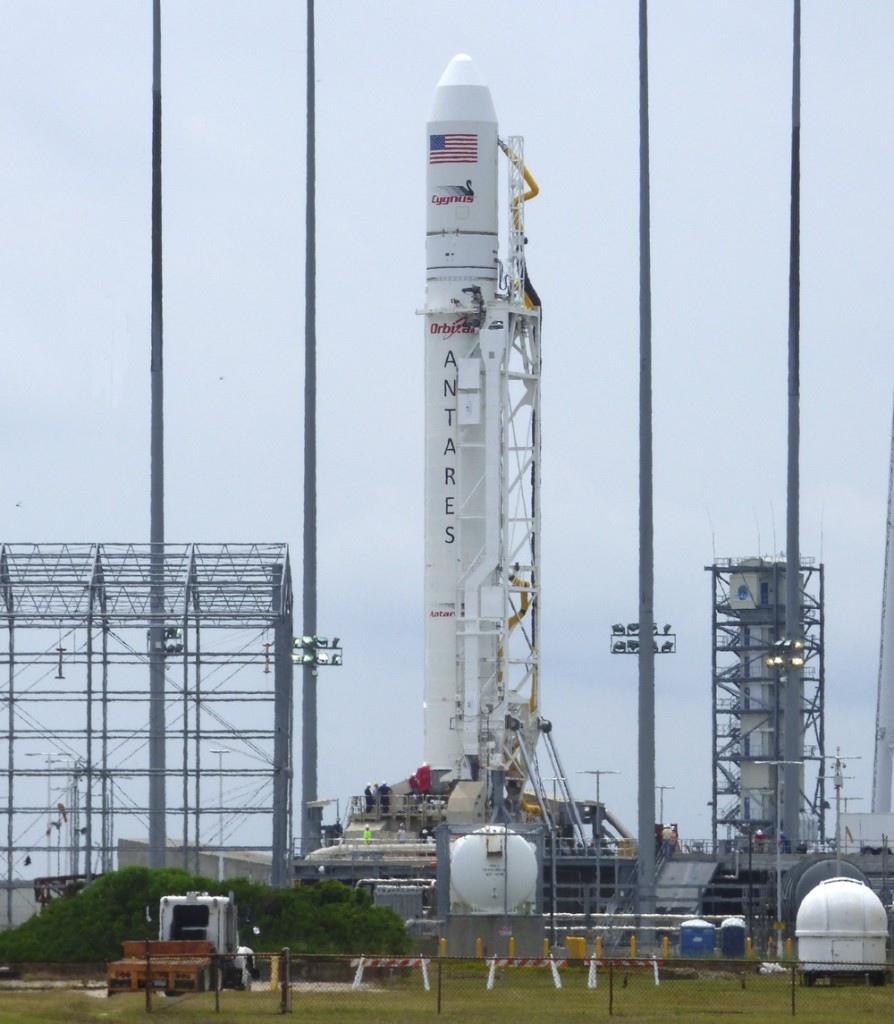
The Antares rocket for the Orb-2 mission to the ISS stands on the launch pad at the Mid-Atlantic Regional Spaceport (MARS) in Virginia on Friday, July 11. Launch is scheduled for July 13. (credit: J. Foust)
NASA and Orbital Sciences said Saturday they believe that weather and technical issues are behind them and will be ready to launch a Cygnus cargo spacecraft to the International Space Station on Sunday.
Mission managers gave approval Saturday afternoon for the launch at 12:52 pm EDT (1652 GMT) Sunday of an Antares rocket on the Orb-2 commercial cargo mission to the station. That launch has been pushed back for two days after weather delayed launch preparations this week at the Mid-Atlantic Regional Spaceport (MARS) at Wallops Island, Virginia.
“It’s been a little bit of a challenge to get to this point, L-1,” said Frank Culbertson, executive vice president of Orbital Sciences, in a briefing Saturday afternoon at Wallops, referring to the milestone of one day before launch. The launch was originally planned for May but was pushed back first because of ISS schedules (including the delayed launch of a SpaceX Dragon cargo mission) and, more recently, because of concerns about the first stage engines on Antares.
Orbital officials have not gone into great detail about the concerns with the AJ26 engines that power the first stage. A failure of an AJ26 on a test stand at NASA’s Stennis Space Center in May—an engine being tested for a future Antares mission—prompted the delay of what had been planned to be an early June launch. In early July, Orbital announced that inspections of the two AJ26 engines on this Antares had been completed, and cleared the vehicle for launch.
“I can’t get into too much detail about the actual nature of the problem,” said Mike Pinkston, Antares program manager at Orbital. “Based on our investigation, we did do some specific, targeted investigations of the fleet of engines we have, notably the two that are on the Orb-2 rocket right now, and did see what we needed to see in terms of proper configuration of some specific features of concern. Obviously, those engines have a solid test history behind them as well, so we’re very confident we’ve got two good engines on the vehicle.”
With those technical issues behind them, weather is not expected to be a factor tomorrow. Sarah Daugherty, test director at NASA Wallops Flight Facility, said forecasts call for a 90% chance of acceptable weather for Sunday’s launch. There’s a very small chance of clouds, she said, hence the less-than-100% odds of acceptable weather. “They never give us 100%,” Culbertson quipped.
One other issue raised at Saturday’s briefing deals with the range. With the launch taking place midday Sunday in the middle of summer—the height of tourist season on the Virginia coast—there’s a concern recreational boaters could enter the hazard zone for the launch, potentially scrubbing it since the launch window lasts only five minutes.
“For this one, we have taken an extra step” because of the higher number of boaters expected on the waters, Daugherty said. That includes making visits to harbors in the area to remind boaters of the launch and the keep-out zones they need to observe. “We have made those extra strides for this launch, and we’re confident that we can have a clear range at the first second of that five-minute window.”

Leave a Reply